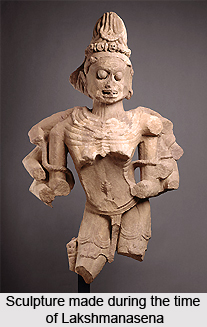Lakshmanasena was the last king of the Sena lineage, who succeeded the throne after his father Vallalsena in or about 1179 A.D. According to the available records of the contemporary era, Lakshmanasena was the last native ruler of independent Bengal till date. Taking charge after his predecessor Vallalsena, he expanded the Sena empire at least to the territories of kamrupa , kalinga, Kashi and probably fought with the Chedi and the Mlechcha kings. The Sens ruled from the capital Bikram Pur, a city close to present day Dhaka in Eastern Bengal. However it was after Lakshmanasena, Bengal came under the wave of the Muslim invasion led by Bakhtiyar Khalji in Bengal, who established the Muslim supremacy in the extensive region of Bengal. The important sources of the study of Lakshmanasena`s rule in Bengal are the epigraphic and the literary evidences, contemporary to his rule. According to Minhaj, Lakshmanasena ascended the throne at the late age of sixty. Lakshmanasena was not at all competent like his predecessors. The task of consolidating Bengal and the initiation of an efficient administration was established by Vijayasena and Lakshmanasena assumed the title of the Sena pedigree in order to denote his power and status. He ascended the throne as a cipher who ruled peacefully till the wave of Muslim invasion washed away the Sena kings completely from the heart of Bengal.
 The pathetic defeat in the hands of the Muslim invader Bakhtiyar Khalji however could not prove him an incompetent king. As a crown prince, he participated in the expansionist policy of his grandfather Vijayasena and had made additions to the territory of the territory of Bengal by defeating the kings of Gauda, Kalinga, Kamrupa and Kasi. One of the significant political achievements of Lakshmanasena was his success against Gahadavalas. The Gahadavalas had overthrown the palas from Magadha. Their frontier was adjacent to the Sena kingdom. The "Sasaram inscription" to the Gahadavalas shows that Vijayachandra Gahadavala and his son Jayachandra occupied Magadha. The ascendancy of the Gahadavalas in the adjacent region, Magadha, appeared as a threat to the foundation of the Sena Empire in Bengal. Lakshmanasena competently drove this powerful enemy out of Magadha and carried his victorious campaign from the right upto the territories of Beneras and Allahabad, which constituted the core of the Gahadavala supremacy. However there is a keen controversy regarding the conquest of Beneras and Allahabad among the historians. Dr. Tripathy has challenged the laudable claim of Lakshmanasena in respect of his conquest of Beneras and Allahabad and founding pillars of victory on the banks of Ganges. But the other groups of historians however refuted the theory approached by Dr. Tripathy.
The pathetic defeat in the hands of the Muslim invader Bakhtiyar Khalji however could not prove him an incompetent king. As a crown prince, he participated in the expansionist policy of his grandfather Vijayasena and had made additions to the territory of the territory of Bengal by defeating the kings of Gauda, Kalinga, Kamrupa and Kasi. One of the significant political achievements of Lakshmanasena was his success against Gahadavalas. The Gahadavalas had overthrown the palas from Magadha. Their frontier was adjacent to the Sena kingdom. The "Sasaram inscription" to the Gahadavalas shows that Vijayachandra Gahadavala and his son Jayachandra occupied Magadha. The ascendancy of the Gahadavalas in the adjacent region, Magadha, appeared as a threat to the foundation of the Sena Empire in Bengal. Lakshmanasena competently drove this powerful enemy out of Magadha and carried his victorious campaign from the right upto the territories of Beneras and Allahabad, which constituted the core of the Gahadavala supremacy. However there is a keen controversy regarding the conquest of Beneras and Allahabad among the historians. Dr. Tripathy has challenged the laudable claim of Lakshmanasena in respect of his conquest of Beneras and Allahabad and founding pillars of victory on the banks of Ganges. But the other groups of historians however refuted the theory approached by Dr. Tripathy.
There were also some struggles between Lakshmanasena and the Kalucharis of the west. But the result of Lakshmanasena`s campaign in the west against the Kalucharis was unknown. Also the circumstances of the outcome of Lakshmanasena`s brawl with the western powers is yet unknown.
However the Sena kingdom ceased to exist after the downfall of Lakshmanasena. Towards the closing of the 12th century, the forces of disintegration set in the core of the Sena Empire owing to the internal revolts and the external invasion. Moreover the existing king Lakshmanasena lacked the diplomacy of his predecessors. His rivalry with the Gahadavalas however did not yield anything beneficial to his authority. At the closing decades of the 12th century the Hindu kings of nor6thern India faced terrible reverses due to the external invasion led by Turks under the leadership of Muhammed Ghori. Gradually the Rajputs, the shahis, the Chauhans had collapsed before Ghori. The Gahadavalas stood as a last wall of defence of Eastern India. But Lakshmanasena lacked constructive statesmanship and also had the thirst for expanding his kingdom. Consequently he waged war against the Gahadavalas. Henceforth he did not have any political allies, who could assist him during the external invasion. Lakshmanasena being too short sighted could not rise above the petty political jealousy and rivalry with the Gahadavalas and he had to pay the price, when the Turkish adventurer Bakhtiyar Khalji invaded Bengal after the downfall of the Gahadavalas. However the Turkish adventure by Bakhtiyar Khalji was not the only one responsible for the downfall of the Sena supremacy in Bengal. Taking advantage of the weakness of the Senas, the Deva family began to rose in ascendancy. The rise of the new dynasty with their own independent kingdom disrupted the Sena power to a considerable degree, which Lakshmanasena could not protect. The Turkish invasion only augmented the downfall of the Senas and at the same time initiated the Muslim supremacy.






